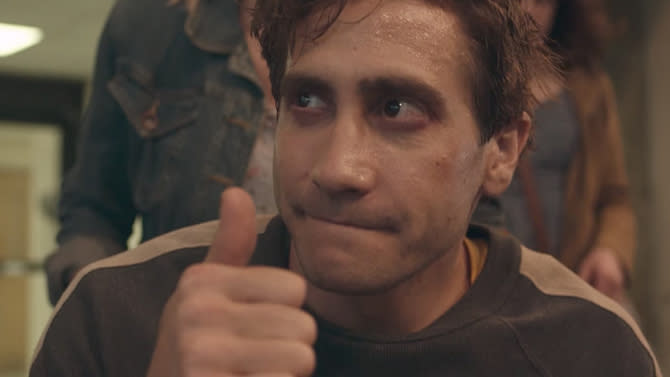'Stronger' review: Jake Gyllenhaal is superb in moving Boston bombing drama

By Andrew Barker
Sometimes movies impress you with their formal daring, their transgressiveness, their experimental boldness. Sometimes movies win you over with visual spectacle, novelty, unpredictability. And sometimes movies don’t necessarily have any of those qualities, they just flat-out work. David Gordon Green’s “Stronger,” a familiar yet undeniably moving film about Jeff Bauman, the everyman Bostonian who lost both his legs in the 2013 Marathon bombing, is a movie that just works.
It works, even though there are plenty of reasons to be suspicious of it. It’s a true story, cloaked in prestige trappings, about overcoming impossible odds. It’s a film about the Boston Marathon bombing that comes less than a year after Peter Berg’s “Patriots Day,” and heir to a long line of sometimes manipulative fact-based films that have seized on a moment of national tragedy to tell an inspirational tale. But then, “Stronger” is an inspirational tale that acknowledges easy inspirational tales are often nonsense. As he follows Jeff from the moment a terrorist bomb changes his life through his long, difficult rehabilitation, Green looks for small but meaningful ways to complicate and deepen the well-trod story he’s telling, and by the end, those complications help the film earn its uplift.
The director certainly gets plenty of help from a superb lead performance by Jake Gyllenhaal, whose recent work has been of such a uniformly high caliber that it’s almost easy to overlook, and who tackles this role with every ounce of his usual commitment. As the film starts, his character is such a Boston type he might as well have been spawned out of a Fenway beer tap: A charming yet go-nowhere twentysomething who still lives at home with a perpetually squabbling, borderline alcoholic family, he spends most days in the same bar with the same people, making the same complaints about the Red Sox game on TV. He has a job at Costco that he often screws up, and he’s in an on-again-off-again relationship with a local girl named Erin (Tatiana Maslany, also excellent) who’s training for the upcoming Marathon, though he’s recently screwed that up too.
In a grand get-her-back gesture, Jeff heads over to the Marathon finish line with a giant handmade sign, trying to disprove her complaint that he “never shows up” for anything. He jostles his way to the front, halfway notices a passing man with dark glasses, and holds up his placard. Just as Erin is rounding the final stretch, two bombs go off. When Jeff wakes up, he’s in the hospital, and both of his legs have been amputated above the knee.
Though the film includes a few glimpses of news coverage, the particulars of the explosion and subsequent citywide manhunt are relegated to the background, even though Jeff has become a media symbol of the tragedy thanks to a gruesome photo of him from moments after the attack, and his eyewitness testimony helped identify one of the bombers. What we do see is Jeff’s messy family – especially his domineering mother (Miranda Richardson, sinking her teeth into a meaty yet somewhat undercooked role) – come together uneasily in the hospital waiting room, and Erin volunteer to stay by his side.
After six weeks in the hospital, he’s recovered enough to make game thumbs-up gestures for the newspaper photographers and smile politely at the constant shouts of “Boston strong!” from passing strangers. Once he gets home, however, things get harder. Without veering into exploitation, Green turns a matter-of-fact eye toward the everyday realities of living with disability: Going to the bathroom, showering, clearing out the sock drawer that he will no longer ever need. Jeff and Erin become a couple again, and Jeff is still enough of a sardonic Boston barfly to get in some dark one-liners at his own expense — the film is often funnier than one would expect. But it isn’t long before depression and hopelessness start to get their tendrils into him, and the film doesn’t shy away from that either.
In the past, Gyllenhaal has slimmed down to a skeletal wisp in “Nightcrawler,” and bulked up to play a boxer in “Southpaw,” but here he delivers an equally physical performance without any dramatic transformation, packing reams of meaning into changes in posture, and delineating a good half-dozen different degrees of hungover. Sure, he has a handful of showy Oscar reel moments, but he’s even more impressive when he and Green take the road less traveled. A long single-take hospital scene in which Jeff has his bandages removed is shot with Gyllenhaal in the foreground, his legs in the background, and neither clearly visible – rather than rub our faces in outward expressions of suffering or shock us with clinical closeups, the scene stresses the despair and out-of-body unreality of such an ordeal.
The film also resists the temptation to make Jeff into a hero or a martyr: He may have more right to be selfish, sullen, and self-destructive than most, but that doesn’t make those impulses any less toxic. If he’s a martyr for anything, it’s the insatiable need of the public to have an easily identifiable symbol in the wake of a tragedy, and Gyllenhaal lets us feel Jeff’s sour uneasiness with being wheeled out to wave a flag at Bruins games and asked to pose for picture and picture. When a stranger cites him as proof that the terrorists can’t win, he looks down at his missing legs and isn’t so sure. His salvation only comes when he learns that being an inspirational symbol can work both ways.

